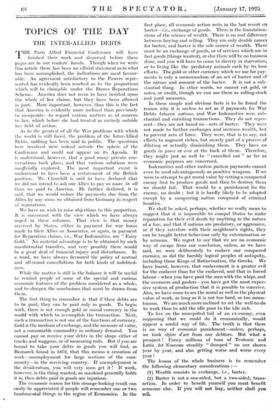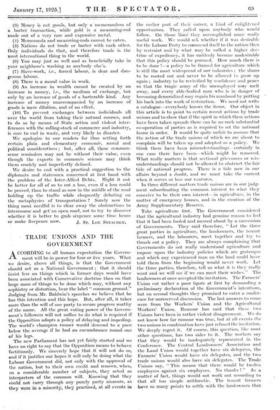TOPICS OF THE DAY
THE INTER-ALLIED DEBTS
THE Paris Allied Financial Conference will have finished their work and dispersed before these pages are in our readers' hands. Though when we write this article there has been no official statement as to what has been accomplished, the indications are mcst favour- able. An agreement satisfactory to the. Powers repre- sented has evidently, been reached as to the proportions which will be claimable under the Dawes Reparations Scheme. America does not seem to have insisted upon the whole of her claims, but they have been allowed in part. More important, however, than this is the fact that America is evidently more inclined than previously to co-operate—to regard various matters as of concern to her, which before she had treated as entirely outside her field of action.
As to the greatest of all the War problems with which the world is still faced, the problem of the Inter-Allied Debts, nothing has been said in public. The questions here involved were indeed outside the sphere of the Conference and could not appear on its Agenda. It is understood, however, that a good many private con- versations took place, and that various solutions were unofficially explored. The most important event is understood to have been a restatement of the British position. Mr. Churchill is said to have declared that we did not intend to ask our Allies to pay us more in all than we paid to America. He further declared, it is said, that we would reduce the payments due from the Allies by any sums we obtained from Germany in respect of reparations.
We have no wish to raise objections to this proportion. It is consonant with the view which we have always urged in these columns. That view is that money received by States, either in payment for war loans made to their Allies or Associates, or again, in payment for Reparation claims, i.e., War Indemnities, are " Fairy Gold." No material advantage is to be obtained by such unsubstantial transfers, and very possibly there would he a great deal of financial injury and disturbance. In a word, we have always favoured the policy of mutual and all-round cancellations for both kinds of indebted- ness.
While the matter is still in the balance it will be useful to remind people of some of the special and curious economic features of the problem considered as a whole, and to sharpen the conclusions that must be drawn from them.
The first thing to remember is that if these debts are to be paid, they can be paid only in goods. To begin with, there is not enough gold or sound currency in the world with which to accomplish the transaction. Next, such a transaction is not one of the function's of currency.
Gold is the medium of exchange, and the measure of value, not a consumable. commodity in ordinary demand. You cannot pay or receive your debts in the shape either of trucks and waggons, or of measuring rods. But if you are bound to take your debts in goods you will find, as Bismarck found in 1872, that this means a cessation of work—unemployment for large sections of the com- munity—in the receiving country. If unemployment is the desideratum, you will very soon get it ! If work, however, is-the thing wanted, as mankind generally bolds it is, then debts paid in goods are injurious.. _ _ .
The economic reason for this strange-looking result can easily be appreciated if people will remember one or two fundamental things in the region of Economics. In the first place, all economic action rests in the last resort on barter—i.e., exchange of goods. There is the foundation- stone of the science of wealth. There is no real difference between buying and selling. They are only double names for barter, and barter is the sole source of wealth. There must be an exchange of goods, or of services which are in fact goods (things wanted), or else there will be no business done, and you will have to come to slavery or starvation, or to living like the predatory animals each by its lone efforts. The gold or other currency which we use for pay- ments is only a memorandum of an act of barter and of the nature and amount of the barter. It is 'not a sub- stantial thing. In other words, we cannot eat gold, or notes, or credit, though we can use them as rolling-stock and yard measures.
In these simple and obvious facts is to be found the reason why it is useless to act as if payments for War Debts between nations, and War. Indemnities were sub- stantial and enriching transactions. They do not repre- sent—they are not based on—acts of barter. They were not made to further exchanges and increase wealth, but to prevent acts of force. They were, that is to say, not efforts to augment riches, but merely part of a process of diluting or actually diminishing them. They have no goods in po.sEe or esse at the back of them. Therefore, they might just as well be " cancelled out " as far as economic purposes are concerned.
Indemnities and other nudurn pactum payments cannot even be used advantageously as punitive weapons. If we were to attempt to get moral value by setting a conquered enemy first to produce goods and then to destroy them we should fail. That would be a punishment for the enemy, no doubt ; but it is hardly likely to be adopted except by a conquering nation composed of criminal lunatics.
We shall be asked, perhaps, whether we really mean to suggest that it is impossible to compel States to make reparation for their evil deeds by anything in the nature of a fine, and that if nations are predatory, or aggressive, or if they interfere with their neighbour's rights, they can be taught better behaviour only by, extermination or by sermons. We regret to say that we see no economic way of escape from our conclusion, unless, as we have said, we were deliberately to enslave our conquered enemies, as did the harshly logical peoples of antiquity, including those Kings of Ratiocination, the Greeks. We have learnt, however, that enslavement is a greater evil for the enslaver than for the enslaved, and that in forced labour—when you have paid the men with the whips, and the overseers and gaolers—you have got the most expen- sive system of production that it is possible to conceive. Also, we have come to see the moral as well as the physical value of work, as long as it is not too hard, or too mono- tonous. We are much more inclined to set the well-to-do to work than to add the idle poor to the idle rich.
To live on the unrequited toil of an ex-enemy, even supposing that we could do it economically, would appear a sordid way of. life. The truth is that there is no way of economic punishment—unless, perhaps, we took objets d'art from our debtors. But what a prospect ! Fancy millions of tons of Teutonic and Latin Art Nouveau steadily " dumped " on our shores year by year, and also getting worse and worse every year !
The lesson of the whole business is to remember the following elementary considerations :— (1) Wealth consists in exchange, i.e., barter..
(2) Barter is not a one-sided, but a two-sided, trans- ' action. In order to benefit yourself you must benefit 'someone - else. If you will not buy, neither shall you Sell. . (3) 'Money is. not goods, but only a memorandum of a barter transaction, while gold is a. measuring-rod made out of a very rare and expensive' metal. . (4) Memoranda and measuring-rods cannot be eaten. (5) Nations do not trade or barter with each other. Only individuals do that, and therefore trade is the most international thing in the world.
(6) You may just as well and as beneficially take in your neighbour's washing as anybody else's.
(7) Slave-work, i.e., forced labour, is dear and dan- gerous labour.
(8) There is a moral value in work.
(9) An increase in wealth cannot be created by an increase in money, i.e., the medium of exchange, but only by an increase of goods of a baiterable kind. Any increase of money unaccompanied by an increase of goods is Mere dilution, and of no effect.
(10) To prevent exchanges between individuals all over the world from taking their natural courses, and to do so by means of. State action and violent inter- ferences with the rolling-stock of commerce and industry, is sure to end in waste, and very likely in disaster.
We apologize to our readers for thus setting forth certain plain and elementary economic, moral and political considerations ; but, after all, these common- sense reminders may not be without their value, even though the experts in economic science may think them crudely and imperfectly defined.
We desire to end with a practical suggestion to the diplomats and statesmen concerned at first hand with the problem of the Inter-Allied Debts. Might it not be better for all of us to cut a loss, even if a loss could be proved, than to stand as now in the middle of the road holding up the traffic while eloquently debating on the metaphysics of 'transportation ? Surely now the thing most needful is to clear away the obstructions to intercourse and gefan open road, not to try to discover whether it is better to grab sixpence some time hence











































 Previous page
Previous page